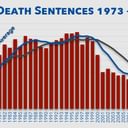Los Angeles Times
By ANTHONY G. AMSTERDAM*
OP-ED
In 1987, the U.S. Supreme Court held, 5 to 4, that evidence of race discrimination in Georgia’s use of the death penalty was not enough to invalidate a death sentence under the equal protection clause of the federal Constitution. During the court’s private deliberations (as Justice Thurgood Marshall’s papers have disclosed), Justice Antonin Scalia admitted that the evidence did show Georgia death sentences were being handed out on grounds of race, but Scalia urged the court to disregard this violation of equal protection in order to allow the states to get on promptly with the business of killing. The published opinion of the Supreme Court engineered Scalia’s proposed result in a less forthright way, using a parade of rhetorical tricks to conceal the majority justices’ aim of expediting the execution of death sentences.
Now, in its ruling for George W. Bush, a majority of the Supreme Court intones solemnly that: “A desire for speed is not a general excuse for ignoring equal protection guarantees.”
In 1983, a majority of the Supreme Court rejected a claim by a condemned Florida inmate that the Florida courts had violated his federal constitutional rights by flagrantly disregarding clear, long-settled rules of Florida law in sentencing him to death. The U.S. Supreme Court opinion, written by Justice William Rehnquist, declared that the federal courts and the federal Constitution could have nothing to do with the matter, because Florida law is whatever the Florida courts say it is, and their interpretations of Florida law are unreviewable by federal Supreme Court justices.
Now, in its ruling for Bush, a majority of the federal Supreme Court suddenly discovers that it has the power to 2nd-guess Florida court decisions of Florida law.
The important point to notice in the presidential election case is not simply the Supreme Court’s abandonment of any pretense at behaving like a court of law. It is not even the sickening hypocrisy and insincere constitutional posturing with which the court’s foray into president- making is dressed up. It is that the court finally has revealed unmistakably what it does all the time and usually gets away with: masking result-driven, political, unprincipled decisions in the guise of obedience to rules of law which the justices feel completely free to twist and retwist to suit their purposes.
To steal an election in this way is bad but is not the worst of it. To take human life by decisions made in this way – as the court has done again and again in the past 2 decades – is among the greater crimes for which the court can now be held accountable on the record it has made for history and eternity.
Anthony G. Amsterdam Is the Co-author With Jerome Bruner of “Minding the Law” (Harvard University Press, 2000), Which Analyzes the U.S. Supreme Court’s Rhetorical Practices



